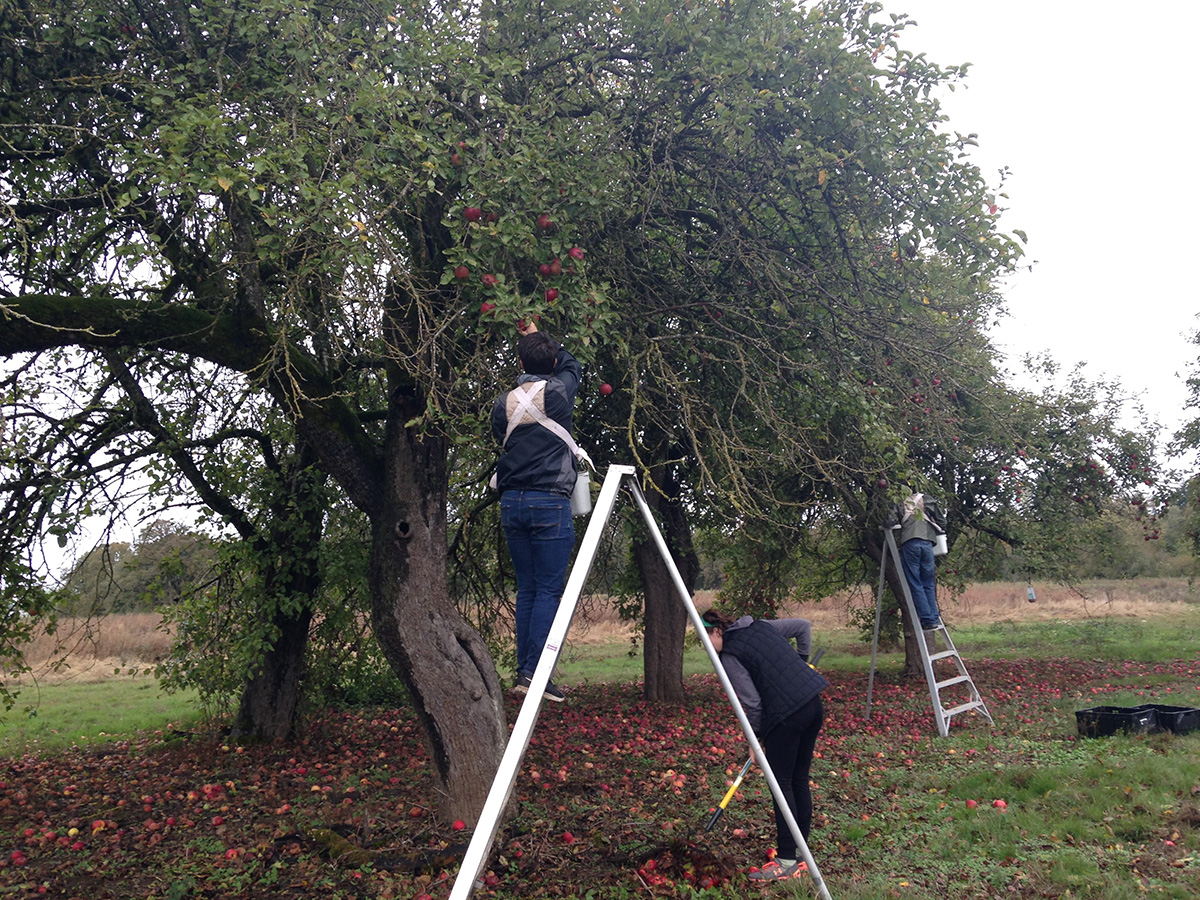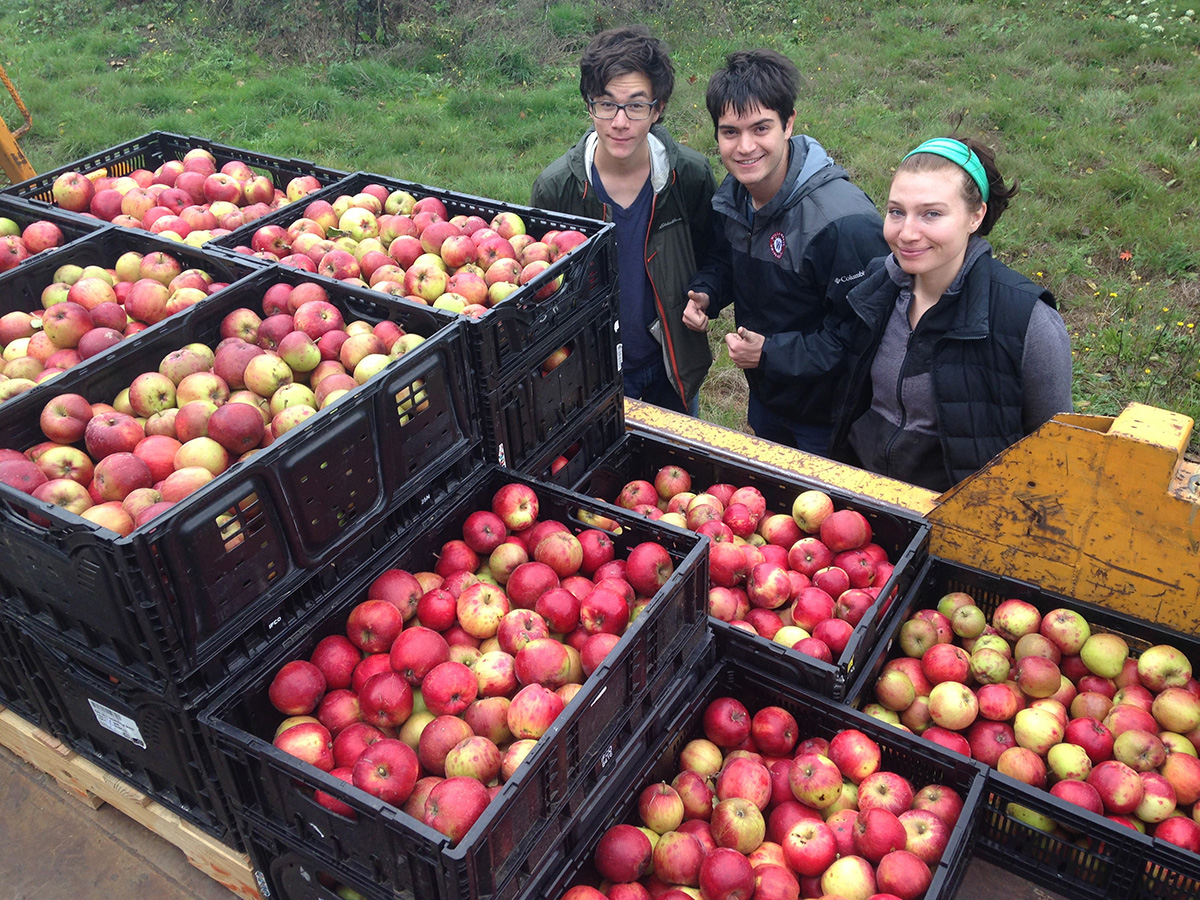Willamette Students Go Gleaning to Help the Needy
- by Maggie Kraft
Bon Appétit chefs and their guests are no strangers to donating excess edible food — by 2018, the company has committed that 80% of its campuses will be Food Recovery Verified, regularly donating food to those in need. At Willamette University in Salem, OR, students began a Food Recovery Network (FRN) chapter in 2014 and meet daily to package and deliver leftovers to a local homeless shelter. But what about the food that never makes it to the café in the first place?

Students picking apples with ladders supplied by Salem Harvest
Across America, 6 billion pounds of produce are wasted on farms, sent to a landfill or plowed under in the fields. Bon Appétit has been a leader in pioneering efforts to reduce that number, through programs such as Imperfectly Delicious Produce, which turns “cosmetically challenged” produce into servable food. The company also partnered with the national, student-run Food Recovery Network to develop a Guide to Gleaning for college students — the first-ever guide of its kind.
Gleaning refers to the ancient practice of collecting unharvested produce from farms, but today, gleaning goes beyond the farm. Gleaners collect excess fresh foods from farms, gardens, farmers’ markets, grocers, restaurants, state and county fairs, and other food-based institutions and businesses and donate the food to the hungry and food insecure.
Gleaning represents a new frontier for students and community members interested in preventing food waste. Currently, more than 25 campuses across the country are using the Guide to Gleaning in their communities.
On a blustery Saturday morning not long ago, I was joined by Willamette students for a gleaning mission at a neglected apple orchard in Molalla, OR. We worked with a local gleaning organization called Salem Harvest, a food waste–education nonprofit that has been gleaning all around the Willamette Valley since 2010 and has established relationships with farmers and businesses. Executive Director Elise Bauman met us at A Quiet Place, a spiritual sanctuary in Molalla with an unused organic apple orchard on the property. Salem Harvest provided the pick bins, ladders, and other tools, and after a quick safety lesson, they set to work harvesting apples from 12 trees on site.
As we picked and snacked on apples — with occasional exclamations “This one is delicious! Try this tree!” ringing across the orchard — people commented on how ridiculous it was that these perfectly good apples would normally go to waste. We spoke with Elise about setting up an annual trip with FRN students.

Willamette students Evan Dilly ’19, Ethan Frank ’20, and Iris Dowd ’17 (president of the campus Food Recovery Network chapter) with the almost 800 pounds of apples they picked
Two hours later, the group had collected every apple within reach and filled the pick bins with nearly 800 pounds of apples to send to Marion-Polk Food Share, the largest food bank in the area. Oregon has the highest rates of childhood hunger in the nation and Marion-Polk Food Share ensures that produce Salem Harvest collects goes to those who need it most. Although Salem Harvest allows gleaners to bring produce home, the students took only what they believed they would use that week.
Gleaning may only save a tiny portion of food waste nationally to date, but gleaning accomplishes so much more — bringing communities together and connecting them with their local farmers, while exposing consumers to the rigors of harvest and farmwork. Perhaps as cosmetically challenged produce gains steam, and as gleaners enjoy their “ugly produce” at home and their experiences with friends, consumer expectations of what constitutes perfect produce will begin to shift — and stores will begin stocking those misshapen peaches or peppers.